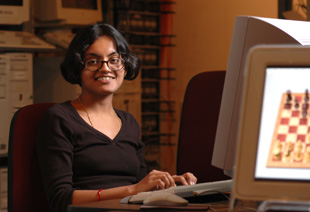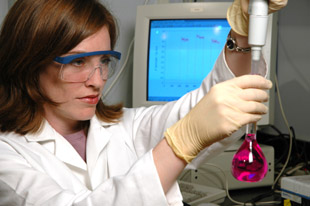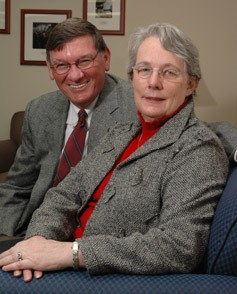

A publication of The Graduate School, University of North Carolina at Chapel Hill
On-Line Version Spring 2005
Home | Back issues | About us | The Graduate School | UNC-Chapel Hill | Make a gift
Help Wanted:
More
minds needed in science and math
 |
| Photo by Will Owens |
|
Computer science student Swaha Miller is supported through the Carol and Edward Smithwick Dissertation Fellowship. Her dissertation on automated theorem proving will help computers think more like humans. |
Graduate school can be difficult. Between writing papers, working in the lab, applying for internships and funding, keeping on top of coursework and still finding time for friends and family, the demands on students sometimes can feel overwhelming.
These constant demands are made more bearable for many graduate students by the support that fellow students and faculty give. Yet for members of underrepresented groups, graduate study often feels particularly isolating. With few fellow students and faculty to identify with, these students sometimes choose to leave graduate school prematurely.
The problem is especially noticeable in physical science and engineering fields, where minority groups and women traditionally have been underrepresented and where attrition rates for these groups are disproportionately high. In 2002, members of minority groups comprised less than 10 percent of U.S. graduate students studying science or engineering, and women received only 27 and 18 percent of doctorates awarded respectively in physical sciences and engineering, according to figures from the National Science Foundation.
While numbers at Carolina are more encouraging than national figures, The Graduate School has planned a three-pronged approach to counter the loss of talent that results when students abandon graduate studies for non-academic reasons. This large-scale initiative will encourage minority and women graduate students in eight of Carolina’s science and engineering departments through financial support provided by recruitment, retention, and dissertation fellowships.
“This is an area where we can make a difference,” said Linda Dykstra, Dean of The Graduate School. “I feel that it is our responsibility to help create an environment in which these students can thrive.”
In spearheading the initiative, Dykstra has targeted the departments where women and minorities are underrepresented: chemistry, physics, mathematics, statistics, geological sciences, computer science, biomedical engineering and environmental science and engineering.
“At the national level there’s a growing awareness that we need a more technologically savvy population,” said Jane Hawkins, a professor in the mathematics department. “Half of the population is women, and with the growing population of African Americans and Latino Americans, it’s important to include everyone in math and science education.”
First, the initiative will provide funds to the target departments to help bring underrepresented students to Carolina for recruitment activities. Helping prospective students learn about faculty members – and vice versa – will help students feel comfortable in their programs.
“When we ensure a good fit between students and departments right from the beginning, the students are much more likely to succeed,” Dykstra said.
Second, The Graduate School plans to allocate funds for mentoring underrepresented students in the target departments. Mentoring workshops will pull together underrepresented students and create a safe space where they can discuss concerns.
 |
| Chemistry
student Mary Robbins values the importance of mentors to her daily
work. A Dykstra Fellow, she has found support and encouragement from
other successful women in the Royster Society of Fellows.
|
 |
| Carol and Edward Smithwick’s support of an endowed fellowship will help underrepresented students achieve success in their graduate programs. |
| Photos by Will Owens |
Such mentoring is important to graduate students’ success, said chemistry student and dissertation fellow Mary Robbins. Although there are few female faculty members in Robbins’ division, bioanalytical chemistry, she has benefited from the interdisciplinary events sponsored by her fellowship that bring together successful students of both genders.
“It has been very encouraging to have exposure to all of these really successful women in graduate education,” Robbins said. “It’s encouraging to talk to women who are obviously successful in their fields and to hear about the choices they’ve made that relate to women, choices that a man wouldn’t necessarily have made.”
Robbins’ dissertation is being supported through the third prong of The Graduate School’s initiative: providing dissertation support for underrepresented students. Her research on preventing blood platelets from sticking to sensors inside the human body is supported by the Linda Dykstra Dissertation Fellowship, made possible through an expendable gift from an anonymous donor.
The Graduate School plans to provide a number of dissertation fellowships for underrepresented students, providing financial support during the most intense part of their graduate careers. One such fellowship already has been endowed: Carol and Edward Smithwick, longtime supporters of graduate research at Carolina, pledged their support for underrepresented groups in science by endowing the Carol and Edward Smithwick Dissertation Fellowship.
“Women really are underrepresented in the sciences,” Edward Smithwick said. “To the extent that you can enhance the prospect that talented women will pursue careers in science, fellowships are very helpful.”
This year the Smithwick Fellowship is helping computer science student Swaha Miller complete her dissertation on automated theorem proving, work that will help computers think more like humans.
“If I didn’t have this funding I would have to go to work to support myself, and that would push my graduation date back,” said Miller. “I’ve known people who’ve taken a year off to work, and sometimes they never finish.”
Dykstra hopes The Graduate School’s efforts eventually will encourage more women and minorities to enter the upper ranks of their fields. There, they would serve as role models for future generations of students who will tackle tomorrow’s tough research problems.
“With many of the problems scientists address, the more diversity that you have approaching it, the better the research will be,” Robbins said. “Having a lot of different points of view is a tremendous advantage.”
And providing financial and moral support for underrepresented students during their time in graduate school will be a tremendous advantage to their future success.
- Grace Camblos
© 2003, The Graduate School, The University of
North Carolina at Chapel Hill
All text and images are property of The Graduate School
at the University of North Carolina-Chapel Hill. Contact Sandra Hoeflich
at shoeflic@email.unc.edu
to request permission for reproduction.